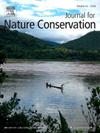当面对假想的未来情景时,管理制度会影响智利海带渔民的反应
IF 2.5
3区 环境科学与生态学
Q2 BIODIVERSITY CONSERVATION
引用次数: 0
摘要
智利北部海带资源的共同管理涉及多种准入制度,这些制度可能影响个体渔民对经济、环境和社会变化的反应。本研究分析了来自阿塔卡马和科金博地区25个沿海协会的126名渔民对三种假设情景的反应:海带价格大幅下降、El Niño对环境的影响以及非法活动的增加。该研究使用调查、列联表和多项逻辑回归来探讨不同管理制度(如区域管理计划(MP)和底栖生物资源管理和开发区域(MEABR))下渔民的社会经济特征和应对策略。研究结果表明,渔民的迁移状态、资源依赖和经营管理制度显著影响渔民的决策。特别是,在面对这三种冲击时,MEABR附属机构比MP附属机构更有可能采取以保护为导向的行动。本研究提供了对关键变量的见解,这些变量可用于改进共同管理政策,以更好地适应未来可能发生的生态和社会经济变化。本文章由计算机程序翻译,如有差异,请以英文原文为准。
Management regimes influence the response of Chilean kelp fishers when facing hypothetical future scenarios
Co-management of kelp resources in northern Chile involves diverse access regimes that could influence artisanal fishers’ responses to economic, environmental, and social changes. This study analyzes the responses of 126 fishers from 25 coastal associations in the Atacama and Coquimbo regions to three hypothetical scenarios: a significant drop in kelp prices, environmental impacts from El Niño, and increased illegal activity. The research uses surveys, contingency tables, and multinomial logistic regression to explore the socio-economic characteristics and response strategies of fishers within different management regimes, such as Regional Management Plans (MP) and Management and Exploitation Areas for Benthic Resources (MEABR). Results indicate that migratory status, resource dependence, and management regime in which they operate significantly influence fishers’ decisions. Particularly, MEABR affiliates are more likely to adopt conservation-oriented actions compared to those under MP when faced with the three types of shocks. This study contributes insights on critical variables which can be tailored to refine co-management policies to better accommodate future possible ecological and socio-economic changes.
求助全文
通过发布文献求助,成功后即可免费获取论文全文。
去求助
来源期刊

Journal for Nature Conservation
环境科学-生态学
CiteScore
3.70
自引率
5.00%
发文量
151
审稿时长
7.9 weeks
期刊介绍:
The Journal for Nature Conservation addresses concepts, methods and techniques for nature conservation. This international and interdisciplinary journal encourages collaboration between scientists and practitioners, including the integration of biodiversity issues with social and economic concepts. Therefore, conceptual, technical and methodological papers, as well as reviews, research papers, and short communications are welcomed from a wide range of disciplines, including theoretical ecology, landscape ecology, restoration ecology, ecological modelling, and others, provided that there is a clear connection and immediate relevance to nature conservation.
Manuscripts without any immediate conservation context, such as inventories, distribution modelling, genetic studies, animal behaviour, plant physiology, will not be considered for this journal; though such data may be useful for conservationists and managers in the future, this is outside of the current scope of the journal.
 求助内容:
求助内容: 应助结果提醒方式:
应助结果提醒方式:


